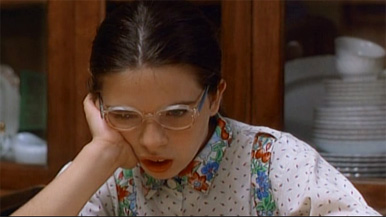Viking Night: Welcome to the Dollhouse
By Bruce Hall
June 21, 2016
Dawn Wiener is her name, and she’s already broken the number one rule of not getting your ass kicked in junior high – do NOT have a funny name. Actually, that’s Rule Two. She’s also breaking Rule One, which is “don’t be funny looking.” Not that 85 percent of us ARE at that age, or anything. But Dawn’s descent into pre-adolescent hell at the hands of the public education system is by no means the beginning of her misery. Nobody hates her more than her own family, to the degree that Dawn’s suffering reaches Dickensian levels almost immediately.
Dawn’s little sister Missy (Daria Kalinina) is a plucky, adorable JonBenet Ramsey lookalike who just enchants everyone around her. She’s also a selfish tattletale and makes Dawn’s life miserable. Dawn’s mother (Angela Pietropinto) clearly favors Missy and never loses an opportunity to make this abundantly clear. Dawn’s father (Matthew Faber) is a feckless moron who agrees with whatever his wife says, as long as she feeds him. And Dawn’s older brother Mark (Matthew Faber) is an emotionless husk who lives only to get good grades and make college, social life be damned, girls be damned. His level of support for Dawn could be best described as “incidental.”
Dawn is wildly unpopular at school, seeing as how she’s socially and physically awkward in a variety of unfortunate ways. She fruitlessly pines after an older boy named Steve Rodgers (Eric Mabius), a handsome, troubled, Jim Morrison type whose future prospects are dim at best. Meanwhile, class bully Brandon (Brendan Sexton III) is closer to Dawn’s age, and the two social outcasts develop a bizarre, unhealthy obsession with each other that bookends the film and provides, for the most part, what little plot there is here. Brandon’s home life is troubled in different, darker ways than Dawn’s, but it’s that darkness that draws them together.
The big difference though, between Dawn and just about everyone else in town, is that Dawn seems to have a soul.
There’s not so much a narrative here as there is an extended process of mutual estrangement between Dawn, the student body of her school in general, and her family and circle of immediate acquaintances in particular. Nearly everyone in this film is at best utterly dismissive of the little girl and her feelings, and at worst are openly contemptuous or hostile toward her. The worst thing that ever happened to me in high school, times a thousand, doesn’t even come close to the horrendous level of abject misery Dawn experiences over the course of this story.
It’s meant to be amusing, not unlike Better off Dead, which told a similarly offbeat tale of childhood alienation. But in this case the inherent humor is less obvious. That other movie is an intentional farce, while this one relies more on the ugly, stupid reality of being a pre-teen for most of its humor. I’ve already explained how this approach comes across - you laugh, but with reservations - but when taken as a whole, the point of the story seems to be that sometimes, life is what it is, and there’s little meaning to it past that. Why is growing up easier for some than others? Why is life so unfair sometimes? How come the people who love you the most hurt you, while the person you’ve tried so hard to hate all year seems to relate to you better than anyone?
The answer is that most of the time, there ARE no clear answers.
In the end, how you respond to adversity is, as they say, the biggest indicator of how you’re wired. And what makes Dawn of interest is the relative level of decency with which she handles nearly all of her misfortune. Sure, she has her moments – she smashes a videotape of a family party when it contains s scene of her falling into the pool. Later, she is barely able to stop herself from going Bob Crane on her sister with a hammer. It’s dark stuff, but Dawn is not a violent, or even really a particularly mean person. By the end of the film, you have to assume that she’s either going to come out of her teen years a better person, or she’ll grow up to marry Rob Zombie.
Welcome to the Dollhouse probably requires a repeat viewing to appreciate, so if you don’t enjoy it the first time, it’s going to be hard to convince you to give it another go. But if you can manage it, and you can tap into that deep vein of misery and disaffection not all of us seem to have, you might find food for thought. And if not...then I am happy to hear you enjoyed YOUR childhood so much.
Continued:
1
2
|
|
|
|




